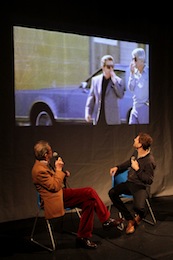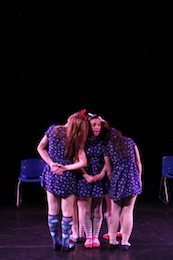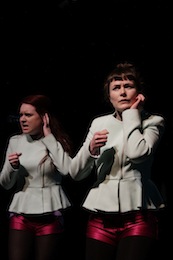THEATREclub’s The Theatre Machine Turns You On: Vol. 3 returned to the Project Cube for a ballsy run comprising a chart-topping 24 new plays spread over just two weeks. The pieces, which were selected by curators Grace Dyas, Doireann Coady and Shane Byrne of THEATREclub, fell under four main strands (reminiscent of the 1968 LP ‘The Rock Machine Turns You On’ from which the festival’s name is derived) namely  ‘Demotape: Lo fi works in progress,’ ‘New Releases: new artists with new work,’ ‘LPs: Long play(ing) records,’ and ‘EPs: Late night fun.’ Show after show after show after show (yes that’s four shows, sometimes five) each night, The Theatre Machine is indeed becoming less of a ‘mini’ and more of a ‘revolutionary’ festival.
‘Demotape: Lo fi works in progress,’ ‘New Releases: new artists with new work,’ ‘LPs: Long play(ing) records,’ and ‘EPs: Late night fun.’ Show after show after show after show (yes that’s four shows, sometimes five) each night, The Theatre Machine is indeed becoming less of a ‘mini’ and more of a ‘revolutionary’ festival.
At first glance, everything about The Theatre Machine (from the eye-wateringly busy programme to the long tables-cum-scribble pads and the giant yellow-eyed owl residing under the stairs of the foyer) seemed promising. There was undoubtedly a kind of excited electricity emanating from the crowds that gathered for the occasion under the massive handmade letters spelling 'The Theatre Machine Turns You On' which loomed boldly above the tiny black box theatre of the Cube. It felt like anything was possible, but then again, I’d been told it would turn me on. My expectations were inevitably high.
Sheer Tantrum’s debut of Konstantin Has Shot Himself made for a deft and entertaining parody of Chekhov’s The Seagull, a production complete with an expressly articulate blue and lime-green puppet, an impressive near death scene with a water-pistol and two hilarious synchronized stripteases. This play on a play (on a play), directed by Vincent A. O’Reilly, explores some of the main themes thrown up by Chekhov’s nineteenth-century play (which was initially a flop) such as artistic failure (ironically), and the art of performance versus the performance of art. The scene changes here were slick and the dialogue snappy, and the whole thing was rounded off with an arse-shaking rendition of Robbie Williams’ 'Let me Entertain You' – with jazz hands, of course. As the puppet so eloquently put it: “Chekhov. Inevitable.” So far so good, I thought.
 But then it got better. Sorcha Kenny’s mesmeric piece Dolls topped the evening, although its subject matter centred on much more unsettling realities. The play opened with what appeared to be five similarly dressed female mannequins in flower-dotted dresses, white knee socks and dolly shoes being wheeled onto the stage one by one on a loading trolley. Only after the lifeless bodies were slumped into chairs did they actually transpire to be somewhat human. Gradually, in a build-up of mechanized synchrony, these freakishly artificial beings became real doll quintuplets before our eyes. In a series of superimposed sound-clips lip-synced to perfection by the five actors, several slightly terrifying themes were explored including the function of two types of dolls: those designed for little girls, and those designed for grown men (think films like Lars and the Real Girl or The Factory). In a generation of fake eye-lashes and excessively blushed cheeks, the play expressed the notion that female identity is twinkle-toeing towards a speechless, programmed and artificial ideal.
But then it got better. Sorcha Kenny’s mesmeric piece Dolls topped the evening, although its subject matter centred on much more unsettling realities. The play opened with what appeared to be five similarly dressed female mannequins in flower-dotted dresses, white knee socks and dolly shoes being wheeled onto the stage one by one on a loading trolley. Only after the lifeless bodies were slumped into chairs did they actually transpire to be somewhat human. Gradually, in a build-up of mechanized synchrony, these freakishly artificial beings became real doll quintuplets before our eyes. In a series of superimposed sound-clips lip-synced to perfection by the five actors, several slightly terrifying themes were explored including the function of two types of dolls: those designed for little girls, and those designed for grown men (think films like Lars and the Real Girl or The Factory). In a generation of fake eye-lashes and excessively blushed cheeks, the play expressed the notion that female identity is twinkle-toeing towards a speechless, programmed and artificial ideal.
 Glowstick by Mary Red Conroy and Sophie Connon of She’s Got Wind addressed another aspect of the feminist revolution in a much more light-hearted and slapstick manner featuring the hilarious reinvention of the Virgin Mary in all her glow-in-the-dark glory. Complete with a new hair-do, a pair of chicken fillet falsies and a decent dash of lipstick, Mary the blessed virgin makes herself known in pocket-sized apparitions to those who are clearly in desperate need of delivery from evil, like two young girls reapplying their makeup in a nightclub toilet, for example. Although the scene changes were a little staggered, and the funnier moments (like the Irish dancing news readers) recurred and lasted to the point of overkill, this piece was inventive and entertaining. The use of the TV screen on the back wall of the stage (notably for the Skype scene with the expressionless Virgin Mary and her two personal assistants) enhanced the general dimension of this short simple play.
Glowstick by Mary Red Conroy and Sophie Connon of She’s Got Wind addressed another aspect of the feminist revolution in a much more light-hearted and slapstick manner featuring the hilarious reinvention of the Virgin Mary in all her glow-in-the-dark glory. Complete with a new hair-do, a pair of chicken fillet falsies and a decent dash of lipstick, Mary the blessed virgin makes herself known in pocket-sized apparitions to those who are clearly in desperate need of delivery from evil, like two young girls reapplying their makeup in a nightclub toilet, for example. Although the scene changes were a little staggered, and the funnier moments (like the Irish dancing news readers) recurred and lasted to the point of overkill, this piece was inventive and entertaining. The use of the TV screen on the back wall of the stage (notably for the Skype scene with the expressionless Virgin Mary and her two personal assistants) enhanced the general dimension of this short simple play.
The concluding LP of the festival was granted to Madonna by Meadhbh Haicéid, who solely occupied the stage for a lengthy stretch, explaining slowly, with a deliberately dense sort of ring to it all, why she believes that she and Madonna are miraculously linked – soul mates, in fact. For one, their names begin with the same letter, and things only get worse from there. For example, we learn that Madonna’s brother’s name is Martin, and Meadhbh’s ex-boyfriend’s name is also Martin. Go figure. She indulges us in watching her shave her legs, look long and hard at a candle and apply layers and layers and layers (upon layers) of bright red lipstick to the soundtrack of Madonna or Britney Spears (I can’t remember which). While the dangers of celebrity obsession is a theme that can be appreciated here, as well as Meadhbh’s extremely controlled performance, this lengthy and somewhat empty finale unfortunately switched me off.
The idea of The Theatre Machine is to the hungry theatre lover like a sweet shop of newly-invented flavours is to a child (or anyone, for that matter). The programme promised “A new collective cacophony of difference and dissidence,” that this would change my mind, however small that change might be. After each show I passed by the blank blink-less stare of the oversized owl and asked myself whether what I had witnessed had changed my mind.
Konstantin Has Shot Himself reminded me that, yes, Chekhov can be inevitable, but I never considered the funny side of The Seagull quite like Sheer Tantrum have managed. Glowstick changed my mind about what a fiery wig and a dash of lipstick can do for the most age-old and unadorned of faces; I will never look at a statue of the Virgin Mary in the same way again. Kenny’s Dolls both charmed and terrified me with its beautiful delivery of a barefaced message: perfection is impossible, and yet we go on striving. Madonna altered my view of how famous celebrities like the Queen of Pop herself can still find quiet time in a hotel foyer to peer inside the soul of an obsessed fan and ask her what it is she’s afraid of. Or was that just another castle in the air of Meadhbh Haicéad’s imagination?
Overall, the majority of shows I attended demonstrated difference, but not enough dissidence, as promised. However, THEATREclub are gallant the young practitioners to whom we are indebted for as long as The Theatre Machine keeps rolling: Thank you THEATREclub.
Jennifer Lee holds an MPhil in Theatre and Performance and is currently completing her PhD thesis.